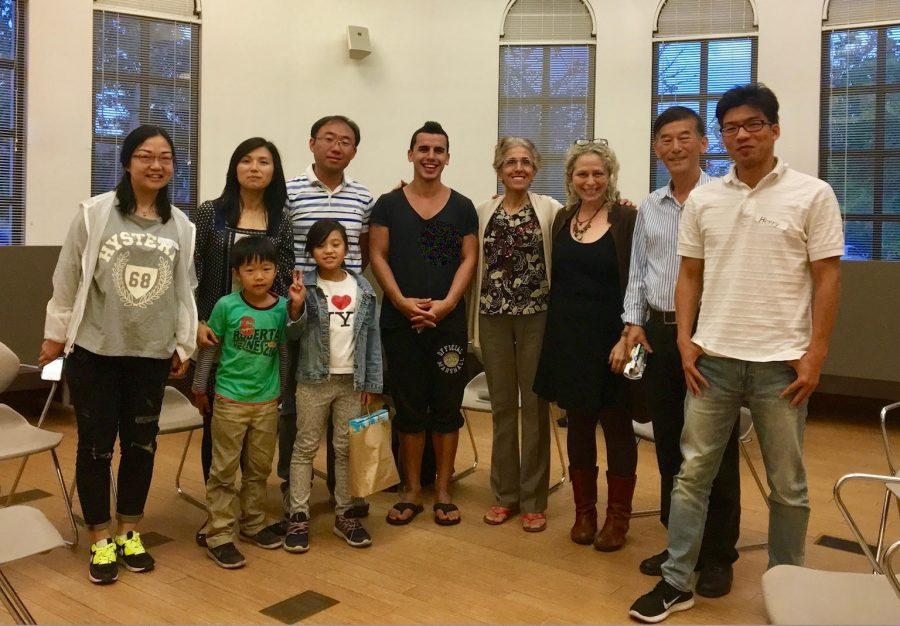Born to Serve: Rabbi Shawn’s Life Outside Milken
Courtesy of Rabbi Shawn Fields-Meyer. Pictured are people from six different countries, all coming together to improve their English.
Natalie Tabibian
Spotlight editor
Rabbi Shawn Fields-Meyer walks into class, books in hand, her necklace and matching earrings dangling as she smiles and reminds us that while she is the main teacher, we can all learn from and teach one another. Around Milken, Rabbi Shawn Fields-Meyer can be recognized by her blonde curls and mellifluous voice, offering kippahs to “anyone of any gender.” She hopes that teaching Torah inspires students to fulfill their responsibility as Jewish people to make the world a better place. Rabbi Shawn clearly practices what she teaches, as exemplified by her ample volunteer work serving those who are in the community who are in need of her help.
She has been at Milken for over twelve years and, in that time, has been the advisor for Girl Talk and the Current Events Club. She works closely with the Service Learning team and is co-leading the 11th grade Civil Rights Journey tiyyul this upcoming Spring. She teaches Jewish Law and Ethics, Jewish Law, and Beit Midrash chumash. After a busy day at school, Rabbi Shawn volunteers her time at a local library to help new immigrants with their English skills. She has been doing this for the last five years. However, her passion for giving back stems from a much earlier time in her life. She remarks that she has “always been involved in serving people on the margins of society.”
Even as a young child growing up in Portland, Oregon, she participated in service with her parents and her larger community. When she became independent in college she was introduced to the homelessness issue through a Jewish friend of hers. Inspired, she joined a “soup kitchen” initiative that was organized by a Christian student organization. Eventually, she took on a leadership role within the soup kitchen for a summer, feeding hungry people in Philadelphia, before obtaining her rabbinic ordination from the Jewish Theological Seminary. From this, she realized she could make a difference “with her own two hands” in the lives of others.
While Rabbi Shawn was in college at the University of Pennsylvania, the Refusenik issue began to gain to gain momentum in America. Soviet Jews were being denied the ability to practice their Judaism openly or to leave the nation. Taking initiative to help her fellow Jews, she got involved in Student Struggle for Soviet Jewry, a young adult branch of the nationwide effort to help the Jewish population who were being persecuted behind the Iron Curtain. Not only did she organize educational and advocacy programs, but when Mikhail Gorbachev, the General Secretary of the Communist Party of the Soviet Union, came to visit President Ronald Reagan, she joined the rally in Washington D.C and orchestrated efforts for others to participate as well. While she was helping Jews in need with her activism, her service extends beyond nationality, race, and socio-economic status.
She is aware of the power of the individual. The Torah says, “justice, justice, you shall pursue” and as someone with freedom, she feels obligated to pursue justice by helping others who are less privileged than herself find their way to freedom. She also spoke on her passion for helping those in need within our community feel included. This is where she has been volunteering for the past five years. Within the public library, there is a literacy program intended to help non-native English speakers, many of whom are immigrants, become more comfortable within America. Rabbi Shawn notes that this volunteer position fuses together her talents and passions: her skills as an educator, her desire for a world of greater Tzedek (justice), and “her love of schmoozing with people.”
In her first year and a half at the library, she was involved in one-on-one tutoring with an El Salvadoran woman who had recently become an American citizen but was struggling with her English. The woman’s goal was to get her GED and eventually go to college. She would meet with her twice a week for an hour and a half to work on her English through reading, writing, speaking, and listening before going home to her husband, Tom Fields-Meyer. She boasts about their three adult children: Ami, Ezra, and Noam. In his mother’s footsteps, Ami is active in social justice work and community building, even serving as a West Area Representative for Mayor Garcetti. Ezra, who has autism and lives with Rabbi Shawn and her husband, has created an animation and has co-authored a children’s book, E-Mergency! and runs his own podcast. Noam is at Emory University studying Music Theory and linguistics, and is planning on perusing his doctorate in Music Theory next year.
Despite her other obligations, when the woman she was teaching moved away, Rabbi Shawn accepted an additional opportunity in the library which she continues today. She teaches a weekly conversation class in the evening. The classes are filled with people from a variety of different countries and backgrounds. She mentioned that on a recent night, out of her seven students, there were people from seven countries and varying backrounds; a Muslim, a Christian, a Hindu, and several secular people were all joined together and being taught conversational English from a rabbi. They found common ground when speaking about civil rights and Martin Luther King Jr.
Although she is giving to these individuals, she has found that from them, she has grown in her own understanding of humanity and learned from them which is what keeps her so passionate about her service. To those that have not yet found their path, she tells people to ask themselves about a community that could use their help and combine that with their passions and skills. “What I found is that everyone is just a human being, and we have more in common than we have different.”

Natalie Tabibian is excited to spend her senior year as Co-Editor-In-Chief! After joining The Roar in her sophomore year, she has written a variety of...



